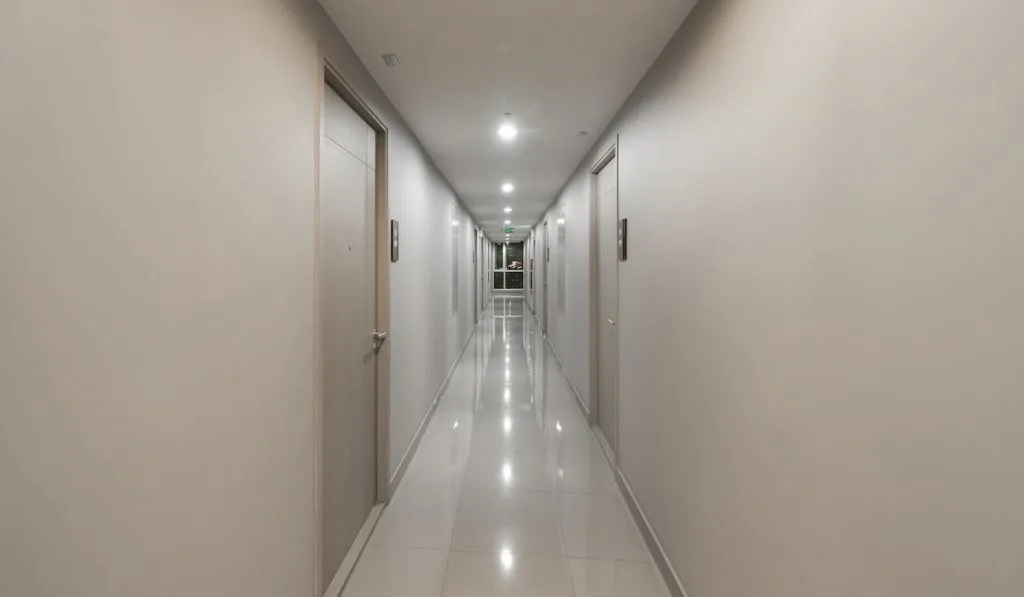How easily does noise travel between floors in an apartment building? Well, that depends on the building and what you’re doing.
Most of us know the pain of hearing what our neighbors are talking about or, um, “doing”, in the unit next door. But what about above you? Can downstairs residents hear what’s going on upstairs?
In most modern buildings, what you’ll hear from upstairs will be, at worst, the dull thud of walking or running across the floor. Typically, though, you won’t hear much.
Older buildings can be a different story. Noise travels much easier, and in severe cases, it can be very distracting.

Whether you’re the upstairs tenant worried about whether your downstairs neighbor can hear you, or you’re about to sign a lease on a downstairs apartment and want to know how bad it will be, here are some things you should know.
Let’s talk about what you can do before you move in and what you can do about it if noise is an issue.
When Noise Becomes an Issue
First, we should say that living in an apartment comes with a lot of perks.
You have access to amenities you wouldn’t have in a townhome or a single-family home like pools and gyms. You often have a management team that will handle a lot of upkeep and repairs.
Also, apartments are usually in more urban areas, so you’ll have better access to restaurants and unique stores that are part of city living.
What you give up, in return for all of the benefits, are personal space away from neighbors and literal space in terms of floorplans. This isn’t always the case, but it’s generally the rule.
That said, everyone who lives in an apartment should expect some level of noise from their neighbors. You’re going to hear doors slamming and the occasional drop of something heavy.
If your neighbor is doing renovations, you can count on some type of disruption for as long as the heavy lifting takes.
However, noise should be a minor nuisance, if a nuisance at all. If you feel like it’s too loud, then you should say something. Try to address it with your neighbor politely and then escalate it to management if you have to.

Is It Louder Upstairs or Downstairs?
Downstairs is always able to hear more than upstairs. If you’re on top of another unit, you’ll probably not hear as much noise compared to the reverse. In many apartments, though, downstairs units can hear walking and even sometimes talking from upstairs.
If you’re worried about noise being an issue, go with the upstairs apartment.
Living upstairs should come with some sense of respect for whoever is living below you. You don’t want to walk loudly or have kids running through the hallways all of the time.
Be particularly sensitive at night because everyone is at home, tired from work, and there is usually more noise being made with more people there.
So, if you’re wondering will having an upstairs apartment be quieter, the answer is yes.
5 Tips for Dealing with Noisy Downstairs Neighbors
That’s not to say that downstairs neighbors can’t be noisy.
How can you address noise concerns without destroying the relationship and souring things between you and your neighbors?
Most people want to live around friendly people and have some sort of community in their apartment building. It doesn’t mean you have to be best friends with your neighbor, but you should try to make some sort of effort.
Here are some things you can do to address the noise.
1. Build the Community First
You have to build some common ground and goodwill if you want your neighbor to respond positively to feedback about the noise.
Imagine if someone you’ve never spoken to comes up and gives you some negative feedback about your behavior. Your first instinct will likely be to push back and argue. It’s the same with apartment neighbors.
Work on getting to know your downstairs neighbor before you complain about the noise. That will make asking them to change easier down the road.
2. Speak to them About the Noise
Take a plate of cookies or something over to your neighbor’s house and bring up the subject. Tell them that it’s hard for you to work or concentrate with all of the noise.
If it’s something like loud music, ask that they restrict it to certain hours of the day. Try to find the middle ground.
3. Email About Subsequent Issues
Get their email address and, if they are being too noisy during a work meeting or when kids are trying to do homework, send them a nice, quick note to let them know.
Hopefully, they respond in the right way and stop making noise.
4. Talk to Management

If the problem is recurring or you can’t get through to your neighbor downstairs, bring it up with management.
They can monitor the situation and decide if it’s an unreasonable amount of noise. They can give the tenant a verbal or written warning and let them know that it’s not acceptable.
5. Change Units

If the situation becomes untenable, which happens frequently, unfortunately, you can ask to change units or move to a new building. This, hopefully, is a measure of last resort and can be avoided.
Dealing with noise is part of living in a lot of apartments. Newer buildings will keep out the noise better with improved insulation and spacing.
If you’re worried about noise from an upstairs or downstairs neighbor, give the unit a try before you move in.
Ask other residents in the building or the complex about noise issues and whether it’s a concern. Then decide if it’s something you’re willing to manage before you commit to living there.
